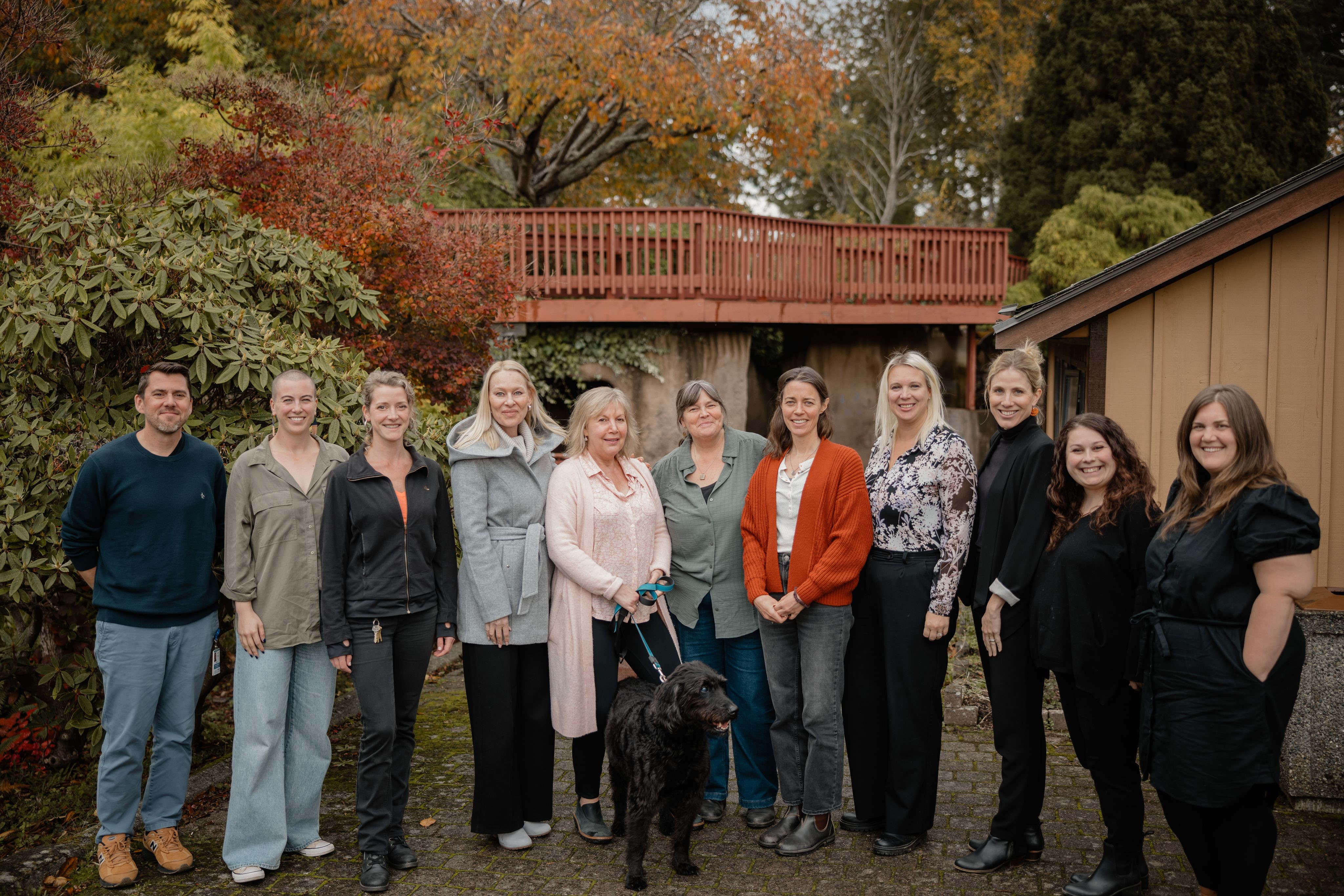Youth and families are expressing gratitude for an Island Health program announced last February, and celebrating the successful graduation of the program’s first cohort after an intensive five-month journey that has profoundly impacted the lives and futures of the youth participants.
“I learned to be with people who have struggles like me. It helped me to grow so much,” said one participant. “I’ve improved my communication skills and learned how to cope with difficult situations. The program improved every area of my life.”
The Adolescent Intensive Day Treatment Program (AIDTP) is for youth 14-18 years old struggling with significant mental health issues and school attendance/participation. It utilizes a trauma-focused approach to providing client- specific mental health treatment and educational programming within a safe and structured therapeutic environment.

The AIDTP Team
“This program is completely and utterly effective, transformative and life saving,” said a grateful parent. “The magic is in the program’s concentration and intensity. To say that it saved our child’s life is not an overstatement.”
The aim of the program is to support youth to improve their mental health and well-being and strengthen relationships with parents, caregivers and peers. Twice per year, two 10-person cohorts receive specialized care at the Queen Alexandra Centre for Children’s Health from a dedicated and compassionate interdisciplinary team that includes a social worker, counsellors, family therapist, recreational therapist, occupational therapist, teacher, educational assistant, psychologist, psychiatrist and administrative support.
“We developed the program to address a gap in service for kids who were chronically suicidal, self harming, and repeatedly hospitalized,” said Henny Laurin, Island Health manager, Child, Youth, Family Mental Health and Substance Use. “Some of our participants haven’t left their homes or attended school in years and this program is giving them the coping skills to be able to do that.”
Amanda Fantillo, a child and youth counsellor, was the first member of the AIDTP team to be hired. She supports youth participants in developing life skills, helping them to build their confidence, foster relationships and meet their goals.
“We’ve created a group structure, but we set each individual up to achieve their own success,” Fantillo said. “Some of these kids felt so broken when they started the program, and the journeys we’ve witnessed have been truly transformational.”
Social worker Maggie Ziegel agrees, explaining how many of the participants feel like they are ‘too much’ and unable to cope with the challenges of life. As such, the program relies heavily on Dialectical Behaviour Therapy (DBT), a proven effective treatment for people who are chronically suicidal, self-harming or resistant to treatment.
“DBT helps us to teach the youth that they can survive their emotions and control their own lives,” Ziegel explained. “If we can help them learn how to tolerate their big feelings and manage the urge to engage in problematic behaviours in an attempt to settle those emotions, we give them agency over their behaviour.”
AIDTP focuses on socialization opportunities, with participants receiving a variety of services including individual and group therapy, on site education in a therapeutic classroom, life skills such as cooking and budgeting, recreational programming, job preparedness and post-secondary exploration. Clinicians also accompany participants on a variety of outings designed to help them build their tolerance and exposure to other people and new experiences while developing a sense of community.
“I feel so privileged to be able to step into every aspect of this program and get to know these kids on a deep and meaningful level,” said Fantillo. “It’s also wonderful to support their families.”
In fact, family participation plays a mandatory role in the program, with clinicians providing family members and caregivers with practical solutions and problem-solving techniques for interacting with their kids through parent coaching and individual and group sessions.
“I think a lot of these kids come to us feeling disheartened, disenfranchised and like they can’t be helped. Their parents are also often at their wit's end,” said Kirsteen Moore, the program’s coordinator. “At the beginning of the program we encountered some pretty scared and upset parents, however when their children graduated from the cohort they were shedding tears of joy. Watching this program unfold has been magical.”
“It is so gratifying to sit with these families and talk about all of the things that makes their child amazing, remarkable and special,” said Ziegel. “We are giving youth and their parents all of these tools and skills they didn’t have before – the whole system transforms and equips these families to take care of their kids and their complex needs.”
While each cohort receives intensive treatment for five months, clinicians work hard to develop transition plans for each participant once they complete the program, all with a goal of helping them to find joy and meaning in a life worth living.
“This program gave our child the space to build trusting and mutually respectful relationships, be vulnerable and develop more self-awareness,” said one parent. “Prior to this program, our child was so ill that we thought we’d lost them forever. By the end of the five months, we got our child back.”
The Adolescent Intensive Day Treatment Program is available by referral only. Download the program brochure for more information.
